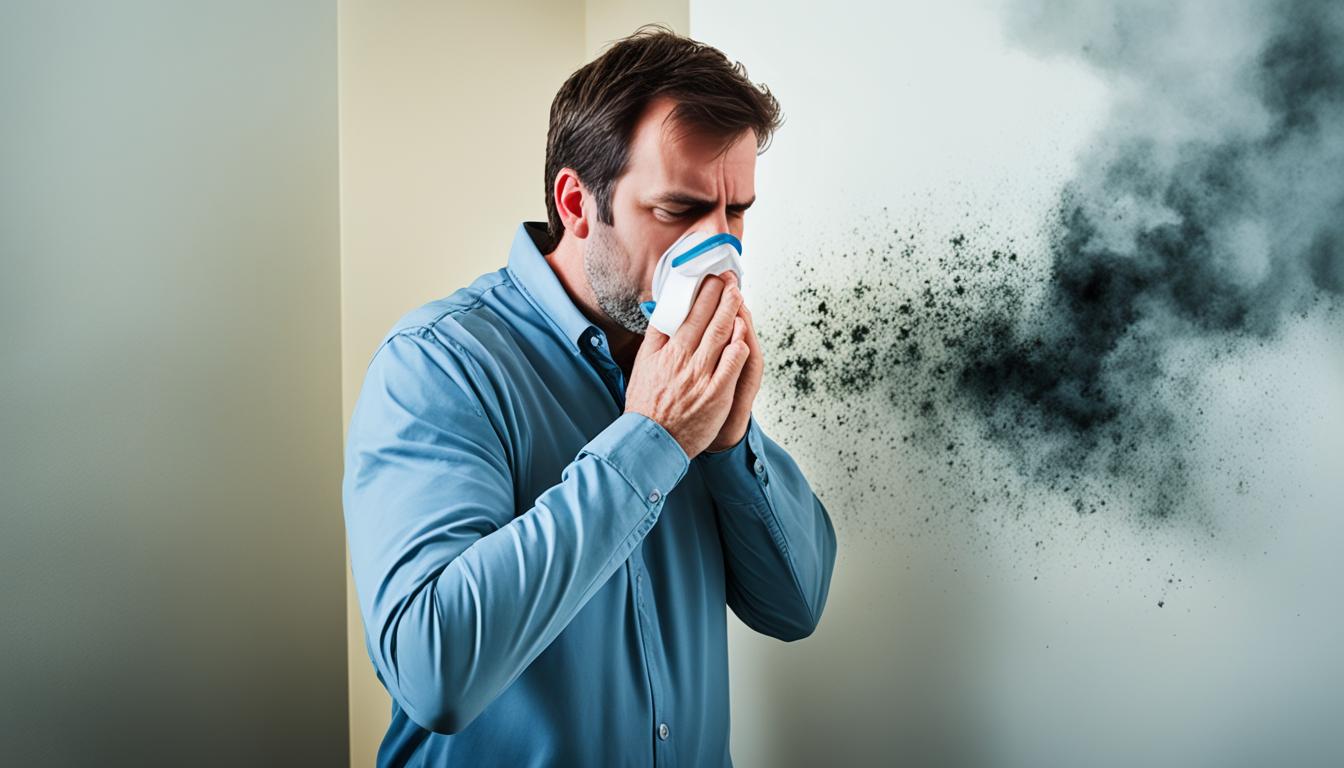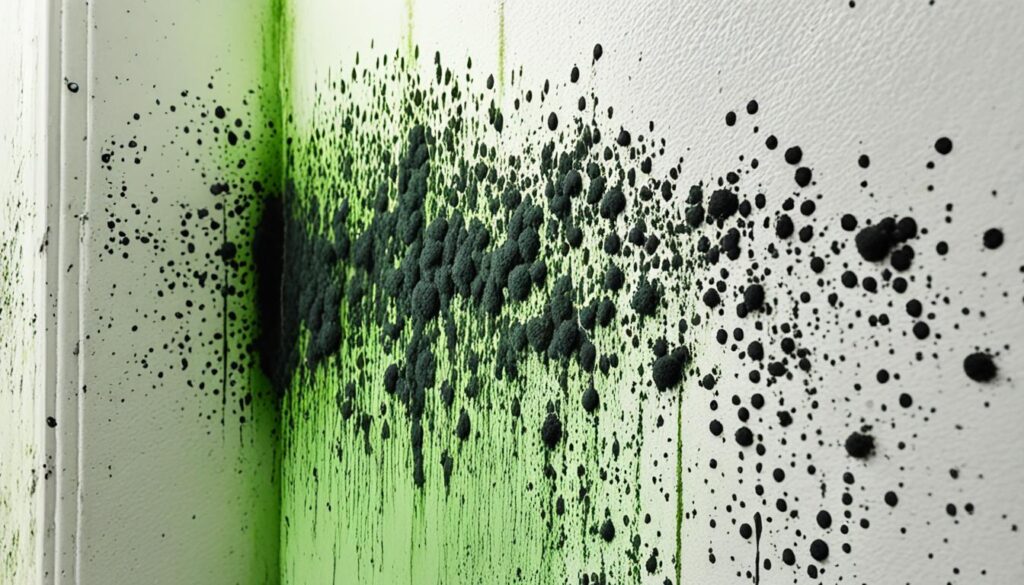
Black Mold Symptoms in Humans Florida Guide
Welcome to our comprehensive guide on black mold symptoms in humans, specifically related to Florida. Black mold is a type of fungus that can grow in damp and humid environments, including homes, offices, and schools. Exposure to black mold can have significant health effects, so it’s crucial to be aware of the symptoms and take necessary precautions.
Black mold exposure symptoms can vary from person to person, and they can mimic allergy-like symptoms or other respiratory issues. Some common symptoms include:
- Respiratory problems such as coughing, wheezing, and shortness of breath
- Allergy-like symptoms such as sneezing, runny nose, and itchy eyes
- Skin rashes, hives, or dermatitis
- Headaches, dizziness, and fatigue
- Memory problems and difficulty concentrating
- Weakened immune system and increased susceptibility to infections
- Chronic sinus infections and recurring nasal congestion
It’s important to note that some individuals may be more sensitive to black mold than others, and prolonged exposure can lead to more severe health issues. If you suspect black mold in your environment and are experiencing any of these symptoms, it is crucial to seek medical attention and address the mold problem promptly.
To better understand black mold and its effects, let’s dive deeper into the topic.
Understanding Black Mold and its Effects
Black mold can pose significant risks to both your health and the integrity of your property. In this section, we will explore the key aspects of black mold, including its growth patterns in Florida, the factors that contribute to its development, and the potential health hazards associated with long-term exposure.
Mold growth in Florida is a common issue due to the state’s warm and humid climate. The combination of high moisture levels and organic materials provides the perfect environment for black mold to thrive. It can often be found in areas such as bathrooms, basements, and other places with poor ventilation and excess moisture.
“Black mold loves damp places, making Florida’s humid climate an ideal breeding ground.”
There are several factors that contribute to the growth of black mold in Florida. These include persistent moisture problems, such as leaks, flooding, or high humidity levels, as well as inadequate ventilation. The presence of organic materials, such as wood or drywall, further sustains its growth.
However, the dangers of black mold extend beyond property damage. Prolonged exposure to black mold can have severe health implications. The spores released by black mold can be inhaled or come into contact with the skin, leading to various health risks, particularly for those with weakened immune systems or pre-existing respiratory conditions.
- Respiratory Effects: Black mold exposure can trigger or worsen respiratory symptoms, including coughing, wheezing, and difficulty breathing. It may also lead to asthma attacks in individuals who are already asthmatic.
- Allergic Reactions: Some people may experience allergic reactions, such as nasal congestion, sneezing, irritated eyes, and skin rashes, when exposed to black mold.
- Immunosuppression: Prolonged exposure to black mold may weaken the immune system, making individuals more susceptible to infections and illnesses.

It’s crucial to address black mold growth promptly to protect your health and prevent further damage to your property. In the next section, we will focus on identifying the signs and symptoms of black mold exposure in humans, enabling you to take prompt action.
Identifying Black Mold Symptoms in Humans
When it comes to black mold exposure, recognizing the symptoms is crucial in order to protect yourself and your loved ones. Black mold, scientifically known as Stachybotrys chartarum, produces toxic substances called mycotoxins that can have detrimental effects on human health. In this section, we will outline the telltale signs of black mold exposure and discuss how it can impact various body systems.
Common Symptoms of Black Mold Exposure
Exposure to black mold can manifest in a variety of ways, affecting the respiratory, immune, and nervous systems. It’s important to note that symptoms may vary depending on the individual’s sensitivity to the mold and the amount of exposure. Here are some common symptoms to look out for:
- Respiratory Symptoms: Persistent coughing, wheezing, shortness of breath, sinus congestion, and sore throat.
- Allergic Reactions: Sneezing, runny or stuffy nose, itchy or watery eyes, and skin rashes or hives.
- Neurological Symptoms: Headaches, dizziness, difficulty concentrating, memory problems, and mood swings.
- Flu-like Symptoms: Fatigue, body aches, fever, and nausea.
It’s important to note that these symptoms can overlap with other common illnesses or allergies. However, if you experience these symptoms consistently in certain locations or when exposed to damp and moldy environments, it may be a sign of mold illness.
Increasing Awareness of Black Mold Health Effects
Research has shown a strong correlation between black mold exposure and various health effects. Prolonged exposure to black mold can lead to more severe symptoms and pose a higher risk to individuals with compromised immune systems, such as infants, elderly individuals, and those with pre-existing respiratory conditions.
“Black mold exposure has been linked to respiratory problems, allergies, asthma exacerbation, chronic fatigue, and even neurological disorders. It’s essential to address any signs of mold growth promptly and take necessary measures to protect your health.”
If you suspect black mold in your home or workplace, it’s crucial to seek professional assistance for proper identification and remediation. Mold testing conducted by certified experts can help determine the presence of black mold and the extent of contamination, ensuring effective removal and prevention of further health risks.

Protecting Yourself from Black Mold
The key to preventing black mold-related health issues is to manage moisture and humidity levels in your indoor environment. Here are some steps you can take to protect yourself and minimize the risk of black mold growth:
- Maintain proper ventilation and airflow in your home.
- Fix any water leaks or plumbing issues promptly.
- Ensure proper drainage around your property.
- Use dehumidifiers in damp areas.
- Clean and dry any water-damaged materials within 48 hours.
- Regularly inspect and clean areas prone to mold growth, such as bathrooms and basements.
By being proactive and vigilant, you can create a healthier living environment and minimize the risk of black mold-related health problems.
Conclusion
In conclusion, preventing black mold growth and ensuring a safe environment is crucial for your health and well-being. By taking proactive measures, you can minimize the risk of black mold in your home or workplace in Florida.
To stay safe from black mold, it is important to address any moisture issues promptly. Keep indoor humidity levels below 50% and fix any leaks or water damage immediately. Adequate ventilation and proper airflow can also help prevent mold growth.
If you suspect black mold in your property, it is essential to seek professional mold remediation services in Florida. Companies like Fix Mold Miami specialize in expert mold removal, using advanced techniques to ensure thorough and effective remediation. Their experienced team can assess the extent of the mold problem and provide tailored solutions to prevent further growth.
Remember, the health risks associated with black mold exposure should not be taken lightly. Be vigilant, follow preventive measures, and prioritize your well-being. Protect yourself and your loved ones by staying informed and taking appropriate action to prevent and address black mold issues.




